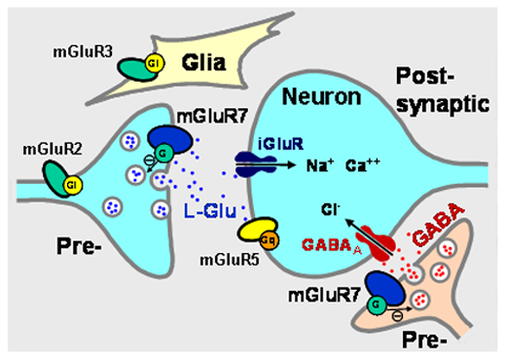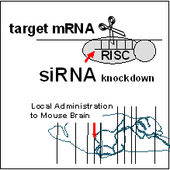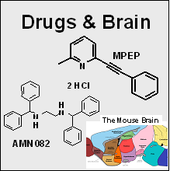
Research
I. General Research Interest – Prof. Dr. Peter J. Flor
Research in our laboratory is focused on trying to better understand the complex interactions, at a molecular and cellular level, between stress and genetics that lead to the manifestation of multiple pathologies such as anxiety, reactive depression, neuronal loss, substance abuse and cognitive dysfunction in certain susceptible individuals.
This effort is paralleled with investigations towards discovery and characterization of new pharmacological therapies – eventually aiming to counteract the deleterious consequences of acute and chronic stress (see our 17 most relevant publications – below).
II. Introduction
Glutamatergic neurotransmission, the main excitatory system in the mammalian brain, has long been implicated as critical regulator of various physiological responses to stress. This transmitter system consists of a broad diversity of genetically controlled factors such as receptors, transporters, associated proteins and down-stream targets. Therefore we’ve chosen to address the roles of its various components in stress-related physiology, behaviour and pathologies, employing a combination of neuropharmacological, behavioural, and genetic models, including knock-out (KO) mice and RNAi technology.
We have concentrated mainly on the metabotropic glutamate receptor subtypes (mGluR1 to -8), which are G protein-coupled, target several effector systems, and act as important pre- and postsynaptic regulators of neurotransmission in stress- and emotion-circuits of the central nervous system (CNS). Within this system, our main focus is mGluR5 and mGluR7 (Fig. 1).

Since the discovery of the drug MPEP (Fig. 4), which is the first potent allosteric blocker of mGluR5, modulation of this receptor has been a long time interest in our group, and preclinical as well as clinical studies in various CNS disorders are on the way. In the future we will investigate the role of mGluR5 in chronic stress.
mGluR7, which shows the highest evolutionary conservation within the glutamate receptor family, has most recently attracted our prime interest. No mGluR7-specific genetic or pharmacologic tools were known when we started our research endeavours, and the receptor’s functional role in any CNS physiology was quite elusive.
My group was among the first to clone mGluR7, and the first to identify two separate isoforms from human brain. This led to the development of a multifaceted decade-long research program focused on drug discovery and elucidating the role of mGluR7 in brain function. Partial mGluR7 mRNA knock-down using siRNA, developed in our group, alters specific anxiety- and stress-related animal behaviours (Fig. 2 and 3); those findings are paralleled by behavioural and neurobiochemical changes that we have discovered in mGluR7 KO-mice, which we have generated and characterized in our group (see publications – below).
 Fig. 2 |  Fig. 3 |
Moreover, we discovered AMN082 (Fig. 4), the first mGluR7-selective drug, which activates receptor signaling via an allosteric site and penetrates the blood-brain-barrier to reach the CNS. AMN082 modulates blood stress hormone responses via central mGluR7 in vivo and shows anxiolytic-like activity in rodents; interestingly, AMN082 facilitates also mGluR7 receptor internalization – a possible mechanism for its anxiolytic action.
 Fig. 4 MPEP & AMN082, two CNS drugs
Fig. 4 MPEP & AMN082, two CNS drugs
III. Future Research Projects
1) Taken together, we and others provided striking evidence that mGluR2/3, mGluR5 and mGluR7 are crucially involved in the regulation of physiological processes involved in acute stress and fear/anxiety-related behaviours. However the underlying neurobiochemical, molecular, and cellular pathways are insufficiently understood. Our future research is intended to shed light on these topics!
2) Although mGluR2/3, mGluR5 and mGluR7 are emerging as fine-tuning regulators of neuroendocrine function and roles in acute stress are established, there is virtually nothing known about their involvement in chronic stress. We intend to determine the effect of modulation of mGluR2/3, mGluR5 and mGluR7 on physiological and behavioural consequences of chronic psychosocial stress in mammals!
3) Over the past two decades we have discovered novel drugs acting on mGluRs, such as PPG, CPCCOEt, MPEP, AMN082, and PHCCC (see publication references below). Over the next years, we intend to increase our knowledge about the exact molecular mechanisms and sites of action of these and related mGluR drugs!
IV. Methods and tools employed in the Flor lab and in international collaborations
- Molecular cloning techniques
- In vitro pharmacology with cloned, molecularly recombined, and native receptors
- Recombinant and native/primary cell culture
- Quantitative real-time PCR
- RNAi – viral and non-viral transfer of shRNA and/or siRNA to cells, tissue, and rodent animals
- Transgenic mice, including gene knock-out animals
- In vivo rodent Behavioural Pharmacoloy
- Molecular Imaging
a) Immuno-histochemistry and -cytochemistry
b) In situ hybridisation
c) Microscopy, including various fluorescent techniques - ELISA, Radioimmunoassays, Western-blotting
- Electrophysiology
V. Most relevant recent Publications (year 2000 until present)
1)
Metabotropic glutamate receptor subtype 7 controls maternal care, maternal motivation and maternal aggression in mice.
Gryksa K, Mittmann L, Bauer A, Peterlik D, Flor PJ, Uschold-Schmidt N, Bosch OJ.
Genes Brain Behav. 2020 Jan;19(1):e12627. doi: 10.1111/gbb.12627. Epub 2019 Dec 14.
PMID: 31793148 (PDF file)
2)
Pharmacological modulation of metabotropic glutamate receptor subtype 5 and 7 impairs extinction of social fear in a time-point-dependent manner.
Slattery DA, Neumann ID, Flor PJ, Zoicas I.
Behav Brain Res. 2017 Jun 15;328:57-61. doi: 10.1016/j.bbr.2017.04.010. Epub 2017 Apr 7.
PMID: 28392321 (PDF file)
3)
Blocking metabotropic glutamate receptor subtype 5 relieves maladaptive chronic stress consequences.
Peterlik D, Stangl C, Bauer A, Bludau A, Keller J, Grabski D, Killian T, Schmidt D, Zajicek F, Jaeschke G, Lindemann L, Reber SO, Flor PJ, Uschold-Schmidt N.
Brain Behav Immun. 2017 Jan;59:79-92. doi: 10.1016/j.bbi.2016.08.007. Epub 2016 Aug 11.
PMID: 27524668 (PDF file)
4)
The Emerging Role of Metabotropic Glutamate Receptors in the Pathophysiology of Chronic Stress-Related Disorders.
Peterlik D, Flor PJ, Uschold-Schmidt N.
Curr Neuropharmacol. 2016;14(5):514-39. Review.
PMID: 27296643 (PDF file)
5)
Relief from detrimental consequences of chronic psychosocial stress in mice deficient for the metabotropic glutamate receptor subtype 7.
Peterlik D, Stangl C, Bludau A, Grabski D, Strasser R, Schmidt D, Flor PJ, Uschold-Schmidt N.
Neuropharmacology. 2017 Mar 15;115:139-148. doi: 10.1016/j.neuropharm.2016.04.036. Epub 2016 May 14.
PMID: 27188844 (PDF file)
6)
Blocking metabotropic glutamate receptor subtype 7 (mGlu7) via the Venus flytrap domain (VFTD) inhibits amygdala plasticity, stress, and anxiety-related behavior.
Gee CE, Peterlik D, Neuhäuser C, Bouhelal R, Kaupmann K, Laue G, Uschold-Schmidt N, Feuerbach D, Zimmermann K, Ofner S, Cryan JF, van der Putten H, Fendt M, Vranesic I, Glatthar R, Flor PJ.
J Biol Chem. 2014 Apr 18;289(16):10975-87. doi: 10.1074/jbc.M113.542654. Epub 2014 Mar 4.
PMID: 24596089 (PDF file)
7)
Orthosteric versus allosteric GPCR activation: The great challenge of group-III mGluRs.
Flor PJ, Acher FC.
Biochem Pharmacol. 2012 Aug 15;84(4):414-24
PMID: 22554564 (PDF file)
8)
Pharmacological interference with metabotropic glutamate receptor subtype 7 but not subtype 5 differentially affects within- and between-session extinction of Pavlovian conditioned fear.
Toth I, Dietz M, Peterlik D, Huber SE, Fendt M, Neumann ID, Flor PJ, Slattery DA.
Neuropharmacology. 2012 Mar;62(4):1619-26.
PMID: 22079159 (PDF file)
9)
Pharmacological modulation of mGluR7 with AMN082 and MMPIP exerts specific influences on alcohol consumption and preference in rats.
Bahi A, Fizia K, Dietz M, Gasparini F, Flor PJ.
Addict Biol. 2012 Mar;17(2):235-47.
PMID: 21392179 (PDF file)
10)
Exciting times beyond the brain: metabotropic glutamate receptors in peripheral and non-neural tissues.
Julio-Pieper M, Flor PJ, Dinan TG, Cryan JF.
Pharmacol Rev. 2011 Mar;63(1):35-58.
PMID: 21228260 (PDF file)
11)
Metabotropic glutamate 7 receptor subtype modulates motor symptoms in rodent models of Parkinson's disease.
Greco B, Lopez S, van der Putten H, Flor PJ, Amalric M.
J Pharmacol Exp Ther. 2010 Mar;332(3):1064-71.
PMID:19940105 (PDF file)
12)
mGluR7 facilitates extinction of aversive memories and controls amygdala plasticity.
Fendt M, Schmid S, Thakker DR, Jacobson LH, Yamamoto R, Mitsukawa K, Maier R, Natt F, Hüsken D, Kelly PH, McAllister KH, Hoyer D, van der Putten H, Cryan JF, Flor PJ.
Mol Psychiatry. 2008 Oct;13(10):970-9.
PMID: 17712315 (PDF file)
13)
Metabotropic glutamate receptor subtype 7 ablation causes dysregulation of the HPA axis and increases hippocampal BDNF protein levels: implications for stress-related psychiatric disorders.
Mitsukawa K, Mombereau C, Lötscher E, Uzunov DP, van der Putten H, Flor PJ, Cryan JF.
Neuropsychopharmacology. 2006 Jun;31(6):1112-22.
PMID: 16237391 (PDF file)
14)
A selective metabotropic glutamate receptor 7 agonist: activation of receptor signaling via an allosteric site modulates stress parameters in vivo.
Mitsukawa K, Yamamoto R, Ofner S, Nozulak J, Pescott O, Lukic S, Stoehr N, Mombereau C, Kuhn R, McAllister KH, van der Putten H, Cryan JF, Flor PJ.
Proc Natl Acad Sci U S A. 2005 Dec 20;102(51):18712-7.
PMID: 16339898 (PDF file)
15)
(-)-PHCCC, a positive allosteric modulator of mGluR4: characterization, mechanism of action, and neuroprotection.
Maj M, Bruno V, Dragic Z, Yamamoto R, Battaglia G, Inderbitzin W, Stoehr N, Stein T, Gasparini F, Vranesic I, Kuhn R, Nicoletti F, Flor PJ.
Neuropharmacology. 2003 Dec;45(7):895-906.
PMID: 14573382 (PDF file)
16)
Antidepressant and anxiolytic-like effects in mice lacking the group III metabotropic glutamate receptor mGluR7.
Cryan JF, Kelly PH, Neijt HC, Sansig G, Flor PJ, van Der Putten H.
Eur J Neurosci. 2003 Jun;17(11):2409-17.
PMID: 12814372 (PDF file)
17)
Selective blockade of metabotropic glutamate receptor subtype 5 is neuroprotective.
Bruno V, Ksiazek I, Battaglia G, Lukic S, Leonhardt T, Sauer D, Gasparini F, Kuhn R, Nicoletti F, Flor PJ.
Neuropharmacology. 2000 Sep;39(12):2223-30.
PMID: 10974306 (PDF file)
18)
Selective activation of mGlu4 metabotropic glutamate receptors is protective against excitotoxic neuronal death.
Bruno V, Battaglia G, Ksiazek I, van der Putten H, Catania MV, Giuffrida R, Lukic S, Leonhardt T, Inderbitzin W, Gasparini F, Kuhn R, Hampson DR, Nicoletti F, Flor PJ.
J Neurosci. 2000 Sep 1;20(17):6413-20.
PMID: 10964947 (PDF file)
